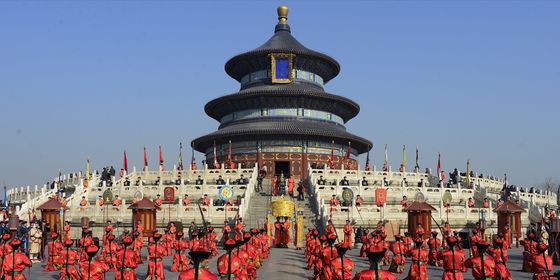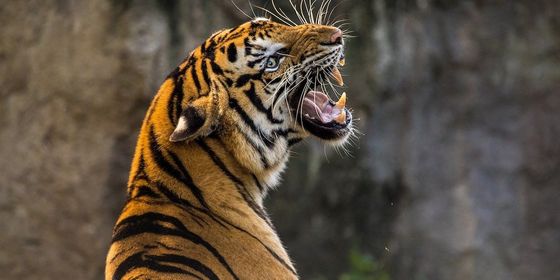These sayings about dogs are more bark than bite
Dogs are one of the earliest animals to be domesticated in history, and China was no exception: Bones of canines have been discovered in the remains of 8,000 to 10,000-year-old villages of the Neolithic Cishan Culture in today’s Hebei province, and the character 犬 (dog) first appeared in the oracle bones, China’s earliest records of writing, 3,600 years ago.
In ancient folk tales and paintings, dogs are depicted as auspicious symbols, playful companions, and loyal sidekicks to their human masters. But despite this pedigree, the characters 犬 and 狗 (dog) were rarely positively used in the Chinese language. In honor of humanity’s oldest friends, let’s look at a few chengyu that expound on the qualities of canines, good and bad.
狗急跳墙 A cornered dog will leap over the wall
This picturesque idiom is a metaphor for evil-doers committing desperate acts when they know they are about to be caught. The full phrase comes from the Yan Zi Fu (《燕子赋》), a collection of folk tales from the Tang dynasty (618 – 907) discovered in the Mogao Caves at Dunhuang: “人急烧香,狗急蓦墙 (Humans will light incense to the Buddha when desperate; dogs will jump over the wall).”
狗头军师 Dog-headed military strategist
Although dogs were known for their intelligence even in ancient times, as demonstrated by stories like “Yellow Ear,” one might still want to think twice before consulting them about important matters. This idiom refers to someone who gives bad advice—and what’s more, loves to do this, unsolicited:
他是团队里的狗头军师,曾为他们出了许多不切实际的方案。
Tā shì tuánduì li de gǒutóu jūnshī, céng wèi tāmen chūle xǔduō búqièshíjì de fāng’àn.
He is the worst strategist on the team, having come up with many impracticable plans.
狐朋狗友 Fox and dog friends
Being such loyal creatures, dogs would make great friends, right? Not so, according to this idiom. “Fox and dog friends” are disreputable and evil associates who would likely lead a person astray.
他不务正业,整天跟那些狐朋狗友玩牌。
Tā búwù-zhēngyè, zhěngtiān gēn nàxiē húpéng-gǒuyǒu wánpái.
Instead of doing honest work, he spends all day playing cards with his shady pals.
犬马之劳 Working like a dog or horse
This rare positive idiom concerning dogs refers to a loyal and selfless kind of service, though it’s often used self-deprecatingly. In the Romance of the Three Kingdoms, when the genius strategist Zhuge Liang (诸葛亮), who was definitely not a 狗头军师, agrees to leave the mountain and serve the warlord Liu Bei (刘备), he says, “As the general wishes, I shall serve you like a dog or horse (将军既不相弃,愿效犬马之劳).”
鸡犬相闻 Within hearing roosters and dogs
As the two most common animals on small farms, roosters (or chickens) and dogs appear together in many chengyu, usually as metonyms for the village or home. This phrase refers to a location that is near at hand, but has also become a metaphor for life in seclusion due to the way it was used in several well-known texts. The Daoist scripture, Dao De Jing (《道德经》), defined a self-sufficient life as, “Though living within each other’s hearing, neighbors do not visit all their lives (鸡犬之声相闻,老死不相往来).” In the fifth century, the poet Tao Yuanming (陶渊明), who was known for living as a hermit and traveling the countryside, described a pastoral country scene as, “Paths criss-crossing the fields, and sounds of roosters and dogs (阡陌交通,鸡犬相闻).”
鸡犬不闻 No sounds of roosters and dogs
This second rooster-and-dog chengyu is deceptively similar to the first, but refers to an utterly isolated place—so desolate that there are no noises of any kind:
这个村庄荒凉冷僻,鸡犬不闻。
Zhège cūnzhuāng huāngliáng lěngpì, jīquǎn-bùwén.
This village is isolated, with no near neighbors.
鸡犬升天 Roosters and dogs ascend to heaven
This idiom refers to the fact that people who achieve success in certain fields can often give a leg up to their relatives, friends, and other hangers-on. It comes from the legend of Liu An (刘安), a philosopher living in the Han dynasty (206 BCE – 220 CE) who allegedly invented an elixir of immortality. It’s said that Liu spilled some of the elixir in his yard, so his roosters and dogs drank it and flew up to the heavens. This gave rise to the phrase, “一人得道,鸡犬升天 (If one person achieves immortality, even chickens and dogs ascend to heaven).” Only the second half of the saying is now used, and usually not flatteringly—it implies that the “roosters and dogs” had no merits of their own, but benefited from nepotism.
Cover image from Pikrepo












